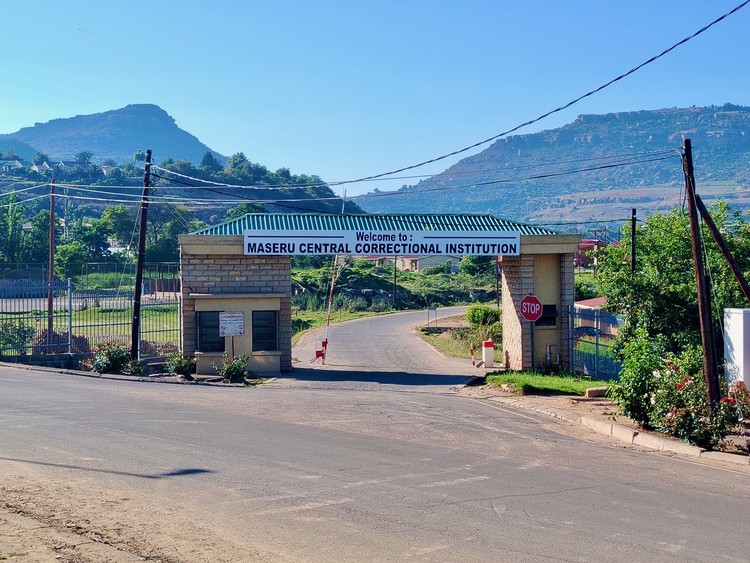Lesotho to release hundreds of prisoners to reduce overcrowding
The government says it is busy implementing recommendations made 22 years ago by the Judge White Commission into prison conditions
Maseru Correctional Institution, built for 600 inmates, is currently housing around 850 people, according to a Member of Parliament. Photo: Sechaba Mokhethi
- Chronic overcrowding in Lesotho’s prisons of nearly 70% above capacity is creating inhumane conditions and a potentially dangerous situation.
- Pretrial detainees make up over 40% of this prison population, with many spending months or years behind bars before their cases are heard.
- The government is now using early releases and renovating prisons in an attempt to reduce the congestion.
Lesotho is releasing some prisoners early in an effort to alleviate chronic overcrowding and to address a humanitarian crisis inside its correctional institutions.
Some 200 inmates were released in July as part of King Letsie III’s birthday celebrations, and the ministry plans to continue granting releases on national special days, such as Christmas, Moshoeshoe’s Day (11 March) and Independence Day (4 October).
In May, the Minister of Law and Justice told the Senate that “at present we have a total of 2,686 inmates, while the combined capacity of the ten districts’ facilities is 1,600 inmates”.
Member of Parliament Mokhothu Makhalanyane said Maseru Correctional Institution, built for 600 inmates, is currently housing about 850 people. He said facilities designed for barely 70 prisoners now hold more than 250, but he did not name any.
He warned that such congestion creates “serious concerns around hygiene standards, health and infection control, mental wellbeing and human dignity”. He expressed concerns about TB, scabies and communicable diseases.
Addressing these concerns in the National Assembly last week, Limpho Tau, Minister in the Office of the Prime Minister, said the government is “aware of the overcrowding” and he conceded that it was causing major health challenges.
A US State Department human rights report on conditions in Lesotho’s prisons in 2023, painted a grim picture. It said: “Prison conditions were harsh but not life threatening due to overcrowding in some facilities; deteriorating infrastructure; physical abuse and inmate-oninmate violence, including rape; and poor food quality, clothing, inadequate sanitary conditions, medical care, ventilation, lighting, and heat.”
It quoted a news report that the men’s prison facilities in Qacha’s Nek, Quthing, and Berea Districts, and women’s and juvenile facilities were unfit for habitation.
Medical care is also strained, with Tau admitting a chronic shortage of nurses.
The report said pretrial detainees make up 42% of the prison population. Detainees spend months, even years, behind bars, waiting for their cases to be heard. Some end up serving periods that match or exceed the maximum sentence for the offences they have been charged with committing.
The ministry for justice and law has adopted a two-part strategy, focusing on early release and infrastructure overhaul, according to Tau.
The Pardons Committee and the Parole Committee will play a central role, vetting prisoners for amnesty (which is granted by the king) or for parole. Tau said only inmates who have served at least half their sentence, demonstrated consistent good behaviour and completed correctional programmes will be eligible. Their victims must, however, be consulted before any release.
On infrastructure improvements, Tau said the government is working to implement recommendations from the 2003 Judge White Commission into prison conditions.
Significant renovations have already been completed at Maseru Central, Mohale’s Hoek, Leribe, and Mafeteng. At Maseru Central, upgrades include new toilets, flushable cell toilets, a clinic, improved ventilation and better access to natural light. Dedicated toilets for inmates who contract infectious diseases have been built at isolation centres in Maseru, Mafeteng, Leribe and Mohale’s Hoek
In a bid to uphold human-rights standards, the ministry has also purchased 3,000 blankets and also fabric for new inmate uniforms. Tau said the government has partnered with the European Union since 2010 to train staff and management on human-rights protections for inmates. This programme is ongoing.
Support independent journalism
Donate using Payfast

Don't miss out on the latest news
We respect your privacy, and promise we won't spam you.
© 2025 GroundUp. This article is licensed under a Creative Commons Attribution-NoDerivatives 4.0 International License.
You may republish this article, so long as you credit the authors and GroundUp, and do not change the text. Please include a link back to the original article.
We put an invisible pixel in the article so that we can count traffic to republishers. All analytics tools are solely on our servers. We do not give our logs to any third party. Logs are deleted after two weeks. We do not use any IP address identifying information except to count regional traffic. We are solely interested in counting hits, not tracking users. If you republish, please do not delete the invisible pixel.

